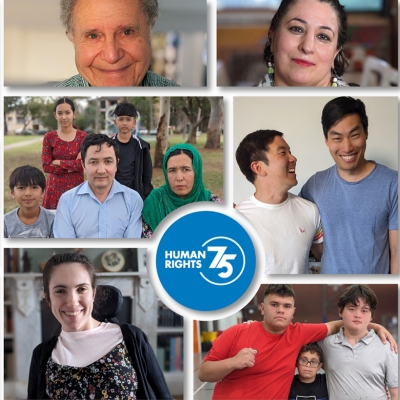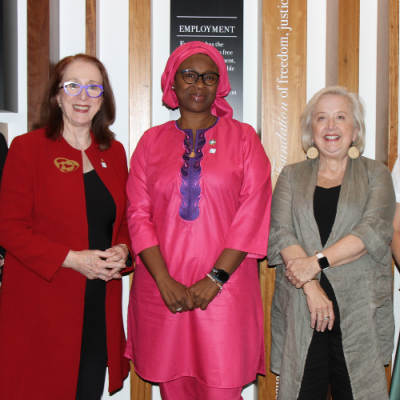Refine results
-
International6 February 2024News story

The Universal Declaration of Human Rights: 75 Years On
-
International10 January 2024Video
How a milestone human rights document came to be
It is considered one of the most important documents ever written in human history. But how did the Universal Declaration of Human Rights shape Australia, and what does it still mean for us today? In part two of our video series commemorating its 75th anniversary, we look at the Declaration's inception. Learn more about our series here. -
International10 January 2024Video
The Universal Declaration of Human Rights: 75 Years On Video Series
In a video series commemorating the 75th anniversary of the Universal Declaration of Human Rights, we hear from a diverse group of Australians about what human rights means to them and where our nation still needs to improve. View the rest of the series here. -
International5 December 2023News story

Visit of UN Special Rapporteur, Francesca Albanese
The Commission recently hosted a visit from Francesca Albanese, the United Nations Special Rapporteur on the situation of human rights in the Palestinian Territory occupied since 1967. -
International28 November 2023News story

Working with Lao Government to protect human rights
The Commission has signed an agreement with the Lao Government and Australian Department of Foreign Affairs and Trade to continue working together to promote and protect human rights in Laos under the Australia-Lao PDR Human Rights Technical Cooperation Program (HRTCP). -
International2 November 2023News story

Engaging with the international human rights system
The Australian Human Rights Commission has recently hosted visits from two UN Special Rapporteurs: the UN Special Rapporteur on the sale and sexual exploitation of children and the UN Special Rapporteur on Human Rights and Climate Change. Special Rapporteurs are independent human rights experts appointed by the United Nations Human Rights Council to investigate, report on and make… -
Employers31 July 2020Project

Upholding the rights of older workers
With support from the NSW Department of Communities and Justice, the Commission has developed an online training package on Upholding the rights of older workers. Access to this online training package is free of charge. -
Employers4 November 2018Webpage

Employers
Employers can explore a range of resources to help prevent discrimination, respect human rights and promote diversity in their workplace. -
International17 January 2017Project
HRTC highlights newsletter - Jan 2017
Working internationally to advance human rights Welcome HRTC Highlights is a bi-annual newsletter that provides updates on Human Rights Technical Cooperation (HRTC) Programs and other international activities undertaken by the Australian Human Rights Commission. Contents Advancing DV crisis intervention Civil society development in China UNSW student interns focus on children’s rights in… -
Employers1 August 2016Webpage
Access for all: Improving accessibility for consumers with disability
Discover practical tips for businesses on improving access to goods, services, facilities, premises and information for consumers with disability. -
International16 March 2016Project
HRTC highlights newsletter - April 2016
Working internationally to advance human rights Welcome Welcome to the first bi-annual newsletter for the Human Rights Technical Cooperation (HRTC) Programs. HRTC Highlights is a new initiative that will provide you with updates from our international human rights activities. This edition highlights a small selection of our recent work in China and Vietnam. Contents The HRTC Programs Recent… -
Employers16 March 2015Project

Good practice, good business
Free employer resources to promote diversity and prevent workplace discrimination -
Employers19 February 2015Quick Guide
Vision Impairment
A guide for employers to support employees with vision impairments in the workplace. -
Employers19 February 2015Quick Guide
Work-related events
An employer can be liable for acts of discrimination or harassment, including sexual harassment, that occur in the workplace or in connection with a person’s employment. This is called ‘vicarious liability’. It means that employers can be liable for acts by their employees that occur at work-related events, such as conferences, training workshops, business trips and work-related social… -
Employers19 February 2015Quick Guide
Working Hours
Offering employees flexible working hours, like other flexible work arrangements, is a way to create a productive workplace that is free of discrimination. In some circumstances, a rule that requires all employees to work certain hours can be indirect discrimination as it may have an unfair effect on some groups of people, such as people with disabilities, women who are pregnant or… -
Employers19 February 2015Quick Guide
Trade Union Activity
It can be discrimination when a person does not experience equal opportunity in employment because of his or her activity in a trade union. This includes being refused a job or dismissed from a job, being refused a promotion, transfer or other benefit associated with employment, given unfair terms or conditions of employment, being refused training opportunities, being refused flexible work … -
Employers19 February 2015Quick Guide
Training
Training for both employers and employees is a key aspect of preventing discrimination and harassment in the workplace. Organisations and employers can undertake training to better understand how they can prevent discrimination and harassment in their workplace. They can also provide training for staff on their rights and responsibilities regarding discrimination and harassment in the… -
Employers19 February 2015Quick Guide
Unjustifiable Hardship
People with disabilities can face significant barriers in many parts of their lives, including getting into and staying in the workforce and accessing public buildings and facilities. The Disability Discrimination Act makes it against the law to discriminate against people with disabilities in many areas of public life, including employment, using goods and services and accessing public… -
Employers19 February 2015Quick Guide
Vicarious Liability
Employers can be held legally responsible for acts of discrimination or harassment that occur in the workplace or in connection with a person’s employment. This is known as ‘vicarious liability.’ For example, employers can be held vicariously liable for discrimination and harassment that occurs at: employer-sponsored events, such as seminars, conferences and training workshops work-related… -
Employers19 February 2015Quick Guide
Transgender
People who are transgender are protected from discrimination by law. The Sex Discrimination Act makes it unlawful to treat a person less favourably than another person in a similar situation because of the gender-related identity, appearance, mannerisms or other gender-related characteristics of the person. Example: A shop assistant refused to serve a person who identifies and presents as a…
